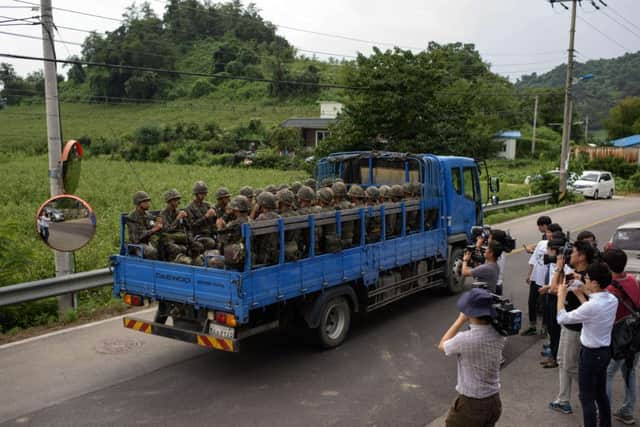Koreas try to find a way back from brink


The closed-door meeting at Panmunjom, where the armistice ending fighting in the Korean War was signed in 1953, began shortly after a deadline set by North Korea for the South to dismantle loudspeakers broadcasting anti-North Korean propaganda at their border, said a South Korean official spokesman. North Korea had declared that its front-line troops were prepared to go to battle if Seoul did not back down.
At the meeting, South Korea’s presidential national security director, Kim Kwan-jin, and Unification Minister Hong Yong-pyo sat down with Hwang Pyong-so, the top political officer for the Korean People’s Army, and Kim Yang-gon, a senior North Korean official responsible for South Korean affairs. Hwang is considered by outside analysts to be North Korea’s second most important official after supreme leader Kim Jong-un.
Advertisement
Hide AdAdvertisement
Hide AdThe meeting came as a series of incidents raised fears that the conflict could spiral out of control, starting with a land mine attack, allegedly by the North, in which two South Korean soldiers were maimed, and the South’s resumption of propaganda broadcasts.
An official from South Korea’s Defence Ministry said that the South would continue with the anti-Pyongyang broadcasts during the meeting and would make a decision on whether to halt them depending on the result of the talks.
While the meeting offered a way for the rivals to avoid a collision for now, analysts in Seoul wondered whether the countries were standing too far apart to expect a quick agreement that could defuse the conflict.
“South Korea has openly vowed to cut off the vicious cycle of North Korean provocations, so it can’t manage to walk off with a weak settlement,” said Koh Yu-hwan, a North Korea expert at Dongguk University in Seoul. “The South will also likely demand the North to take responsibility for the land mine attack and apologise, and there isn’t much reason to think that Pyongyang would accept that.”
Koh, however, said that yesterday’s meeting might open the door to more meetings between the rivals to discuss a variety of issues.
South Korea had been using 11 loudspeaker systems along the border for the broadcasts, which included the latest news around the Korean Peninsula and the world, South Korean popular music and programmes praising the South’s democracy and economic affluence over the North’s oppressive government.
If North Korea attacks the loudspeakers, the South is ready to strike back at the North Korean units responsible for such attacks, an official spokesman said.
Authoritarian North Korea, which has also restarted its own propaganda broadcasts, is extremely sensitive to any criticism of its government. Analysts in Seoul also believe the North fears that the South’s broadcasts could demoralise its front-line troops and inspire them to defect.
The high-level meeting was first proposed on Friday afternoon. The two countries agreed to it yesterday morning after the North accepted the South’s demand that Hwang be present at it.